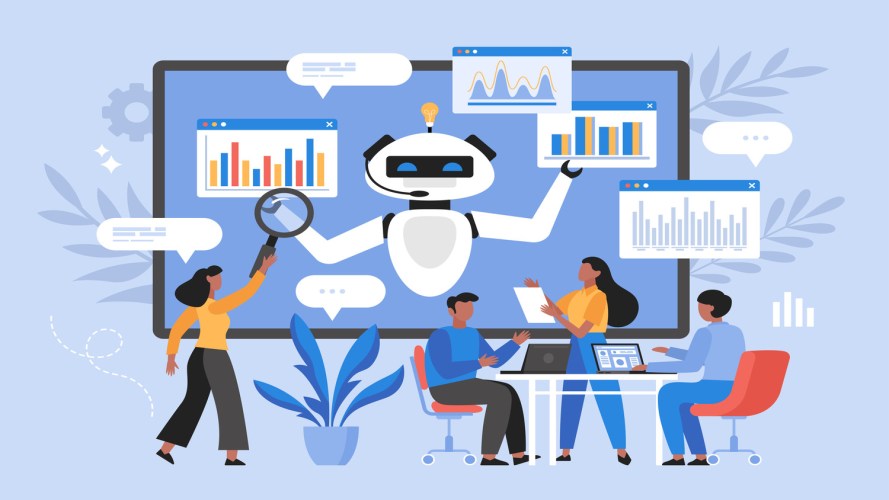We’ve all needed a quick solution—whether it’s resetting a password or troubleshooting an issue. That’s where the Salesforce Help page comes in. With over 60 million visits a year, customers rely on it for everything from troubleshooting to developer support. But what if getting the right help was faster and more personalized?
Salesforce saw an opportunity to enhance the customer experience by integrating AI into customer success. By using Agentforce, they streamlined routine requests and freed up support reps to focus on more complex issues. Salesforce saw an opportunity to enhance self-service, reduce wait times, and free up reps to focus on high-value, one-on-one support.
Today, AI plays a critical role in transforming key customer success metrics for CX leaders. It helps businesses predict customer needs, streamline experiences, and boost engagement. By analyzing vast data sets, AI enables CX leaders to optimize key performance indicators (KPIs) like never before.
Discover Agentforce
Agentforce provides always-on support to employees or customers. Learn how Agentforce can help your company today.


AI in Customer Success: Every Business Can Benefit
It’s not just technology giants that are benefiting from AI. Organizations of all shapes and sizes are using AI tools to transform customer experience and improve KPIs.
AI in Action
OpenTable, a leader in restaurant tech, helps 60k+ restaurants fill 1.7 billion seats a year. With AI and Agentforce, Opentable autonomously handles routine tasks such as reservation changes and loyalty point redemptions. This allows agents to focus on delivering exceptional service in more complete situations.
The Adecco Group is one of the world’s largest talent solutions companies. They process 300 million applications per year and place 1 million people daily for some of the world’s largest companies. With AI, Adecco Group autonomously handles administrative work freeing up recruiters to focus on candidates.
At UserTesting, a company that provides a platform for rapid customer feedback on digital experiences, they are using AI to identify common themes in user interactions.
“Instead of having to watch hours of videos, taking notes, and trying to find the important parts, AI will tell you what is common and echoing from all of these conversations,” Michelle Engel, Chief Product Officer at UserTesting, shared on a recent episode of Experts of Experience. AI has helped her team save time and enhance the quality of insights gathered.
What You Are Missing Without AI
AI’s ability to analyze data, recognize patterns, and predict trends through business intelligence systems has a powerful twofold effect. 1) It directly improves the customer experience and 2) It is enhancing the way metrics are measured.
First, it helps create more seamless, personalized interactions for customers, leading to better engagement, higher satisfaction, and stronger loyalty. At the same time, AI tools make it easier to track and measure key metrics with precision. They can analyze vast amounts of data in real-time, offering deeper insights into trends and areas for improvement. This combination of enhanced experiences and better measurement gives businesses a strong advantage in refining their strategies and achieving their metric goals.
KPIs to Watch (and How AI Can Help)
Before diving too far into what tools to consider, here’s a quick overview of the metrics that matter most and how AI can help improve them.
- Customer Satisfaction Score (CSAT): Measures how satisfied customers are with a product or service. AI can analyze survey data and feedback to identify trends and improve satisfaction.
- Net Promoter Score (NPS): Gauges the likelihood of customers recommending a brand. AI helps by identifying patterns in promoter and detractor behavior and suggesting actionable improvements.
- Customer Effort Score (CES): Assesses how easy it is for customers to resolve issues or complete transactions. AI can streamline processes and automate responses to lower customer effort.
- First Contact Resolution (FCR) & Average Resolution Time: Indicates the percentage of issues resolved during the first interaction and measures the time it takes to resolve customer queries. AI tools, like chatbots, can reduce resolution times by providing instant support or by enabling agents with real-time data and insights.
- Churn Rate/Retention Rate: Reflects the percentage of customers who stop or continue using a service. AI predicts churn and helps design proactive retention initiatives.
- Engagement Rate: Measures how actively customers interact with a brand. AI tracks engagement metrics and suggests personalized strategies to boost interaction.
Whether it’s NPS, CLV, Churn, or any other KPI that you are looking to improve, there are several ways you can fold AI in to help – let’s dive into some specific tools and use cases.
Deploy AI agents with confidence
Learn how to fast-track your Agentforce implementation and drive long-term success.



AI Tools for Improving Customer Experience by Use Case
Below, we break down common Customer Experience challenges and pair them with AI tools that provide effective solutions, offering a closer look at their capabilities and impact.
1. Improving Customer Behavior Prediction with AI
CX Metrics Impacted: Customer Satisfaction (CSAT), Retention Rate, Repeat Purchase Rate
Understanding and predicting customer behavior allows businesses to anticipate needs and offer proactive solutions. Predictive analytics leverages historical and real-time data to forecast actions such as purchasing patterns, potential churn, and product preferences.
Tool: Predictive Analytics Platforms
These tools use machine learning algorithms to identify trends and provide actionable insights into customer behavior. Advanced platforms integrate seamlessly with CRM systems to continuously update customer profiles.
Use Case Example: Saks is enhancing the customer experience by adding a personalization strategy by utilizing first-party data and AI to create a highly customized shopping experience across digital, mobile, and in-store touch points, transforming the luxury shopping experience and fostering loyalty.
2. Enhancing Customer Retention with Personalization
CX Metrics Impacted: Customer Retention, Customer Lifetime Value (CLV), Average Order Value (AOV)
AI-powered personalization tools analyze behavior, preferences, and historical data to tailor customer interactions across channels. These tools make each customer feel uniquely understood and valued.
Tool: Personalization Engines
These AI tools analyze browsing history, purchase data, and customer feedback to deliver real-time content recommendations, personalized email campaigns, or targeted promotions.
Use Case Example: Nationwide is taking personalization to the next level. By using AI and integrating with digital asset management and customer data platforms, they’re making customer experiences more tailored than ever. These upgrades mean smarter, more targeted campaigns and web experiences that feel custom-built for each customer. It’s all about creating connections that keep customers engaged — and coming back.
3. Reducing Churn and Elevating Insights with AI
CX Metrics Impacted: Churn Rate, Net Promoter Score (NPS), Customer Effort Score (CES)
AI-powered sentiment analysis tools use NLP to analyze chat logs, emails, and social media, uncovering customer emotions and dissatisfaction early. By processing vast amounts of feedback, these platforms provide real-time insights and visual dashboards, helping businesses proactively address concerns and reduce churn.
“We can generate a lot of data around how the member is experiencing and navigating the platform without them telling us,” shared Sarah Parker, SVP of Customer Success at BetterUp, on Experts of Experience.
“In the traditional days, you’re waiting for the negative NPS, a CAT survey, or an angry customer email to let you know there’s a problem. Now, there’s a lot that we can do to detect problems before they arise.”
Tool: Sentiment Analysis Software, VoC Analytics Platforms
AI-powered Sentiment Analysis Software and VoC Analytics Platforms help businesses proactively reduce churn and enhance customer insights. Using natural language processing (NLP), these tools analyze text and audio data to assign sentiment scores, enabling teams to identify dissatisfaction early and prioritize outreach. By processing vast amounts of customer feedback, they uncover key themes and trends, refining messaging and improving engagement strategies. Many platforms also offer dashboards to visualize sentiment shifts over time, empowering businesses to make data-driven decisions that enhance customer experience.
Use Case Example: A hospitality brand reviews feedback across platforms like TripAdvisor and Google to identify recurring complaints about check-in wait times, prompting operational changes to address delays.
4. Optimizing Customer Support with AI Automation
CX Metrics Impacted: First-Response Time, Resolution Time, Operational Efficiency.
Automation tools streamline repetitive tasks, ensuring quicker resolutions and freeing up agents to handle complex inquiries. This approach improves efficiency and maintains consistent quality across all customer interactions.
Tool: Autonomous Agents
Autonomous agents are an advanced form of AI that can independently execute a series of tasks, and learn as they go.
Use Case Example: A retail company trains Agents to answer 70% of customer inquiries, including product availability and returns policies. For unresolved issues, the Agent forwards cases with context, reducing agent workload.
5. Enhancing Self-Service Capabilities
CX Metrics Impacted: First-Contact Resolution Rate, Customer Effort Score (CES), Operational Costs.AI Tools Enhancing Customer Success
AI tools empower customers to solve problems independently, reducing dependency on agents while maintaining high-quality service.
Tool: Service Cloud Self-Service
Agentforce can connect customers to relevant answers and provide personalized support from anywhere at scale.
Use Case Example: See how financial institutions can enhance customer satisfaction and deflect cases with AI-powered self-service tools like Service Agent. This empowers customers by providing proactive support and quick resolutions to their inquiries.
How AI Agents Bring All of These Use Cases Together
As AI agents continue to evolve, their impact on customer success will only grow stronger. By leveraging AI-driven insights, CX leaders can proactively address customer needs, refine engagement strategies, and drive meaningful improvements in key performance metrics. The ability to predict behaviors, personalize experiences, and streamline operations positions AI as an essential tool for delivering exceptional customer experiences. Businesses that embrace AI will not only optimize their KPIs but also build stronger, more loyal customer relationships in the long run.






























